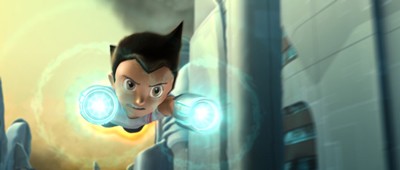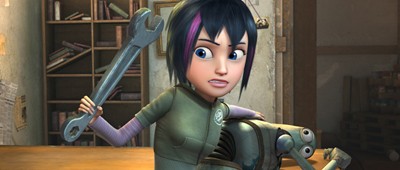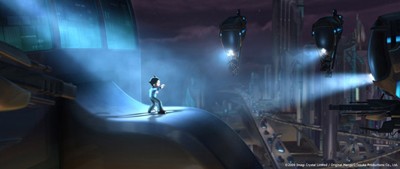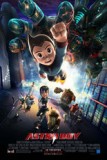| Reviews & Columns |
|
Reviews DVD TV on DVD Blu-ray 4K UHD International DVDs In Theaters Reviews by Studio Video Games Features Collector Series DVDs Easter Egg Database Interviews DVD Talk Radio Feature Articles Columns Anime Talk DVD Savant Horror DVDs The M.O.D. Squad Art House HD Talk Silent DVD
|
DVD Talk Forum |
|
|
| Resources |
|
DVD Price Search Customer Service #'s RCE Info Links |
|
Columns
|
|
|
Astro Boy (2009)

In 1952, manga legend Osamu Tezuka began chronicling the adventures of Astro Boy, a child robot in a world where mechanical men were becoming increasingly more like real humans. Now it's 2009 and there is a new animated movie version of Astro Boy in which digital facsimiles of human beings are created in such a way as to make them look mechanical. This, apparently, is progress. The robots look real, the people do not.
Astro Boy is one of those movies that I take no pleasure in slagging off, because I think that the folks behind it had their hearts in the right place. Despite some dopey concessions to the American market, they clearly have a healthy respect for Tezuka's original creation, which has spawned countless comic books and various animated television shows. Most of the main characters appear in some recognizable fashion, and their origin of Atom, here called Toby (a westernization of the original Tobio), retains the basic heart of the story. If respect for the original were enough, however, every adaptation and remake would be a surefire hit; Astro Boy, at least for me, mostly misses.
The film opens well enough. Director David Bowers (Flushed Away) and co-writer Timothy Harris (Space Jam) start Astro Boy off with an amusing educational video that sets up their futuristic world. Narrated by Charlize Theron, it tells the tale of how humans, wary of the dwindling quality of life on the ground, have built a city in the sky where robots serve their every need. When a particular automaton breaks down or becomes obsolete, they simply shove the metal carcass over the edge of town and let it drop to the earth below, turning the old planet into one giant technological graveyard, a sharp contrast to the utopia above. Using a variation on an old-school animation style, this beginning sequence is funny and clever, which makes it all the more disappointing that much of the rest of the movie is not.
Little Toby (voiced by Finding Neverland's Freddie Highmore) is the son of Dr. Tenma (a terribly miscast Nicolas Cage), one of Metro City's leading scientists in the field of robotics. Dr. Tenma is currently acting as middleman between the war-hungry General Stone (Donald Sutherland) and one of his colleagues, the peace-loving Dr. Elefun (Bill Nighy). Stone wants Elefun's progressive power technology. The good doctor has harnessed alien energy, distilling it into positive blue energy and negative red energy. When Stone fails to heed Elefun's warning and plugs the red energy into a battle 'bot, the resulting hail of bullets leaves Toby dead. Heartbroken, Dr. Tenma rebuilds Toby as a robot, hoping to fully replicate his son in a form where he will be able to defend himself with handy upgrades like rocket boosters in his feet and guns in his hands. Unfortunately, no replication is exactly the same, and the new Toby is more than his dad bargained for. He's also something Stone would love to get his hands on: a source of blue energy.
Before Astro Boy started, I gave a fellow critic a quick rundown on what I knew about the Tezuka manga. I told him that the old stories featured socially conscious themes about civil rights and the proper use of science. Like much post-WWII entertainment in Japan, Astro Boy contained cautionary elements, adopting Asimov's Laws of Robotics as part of its overall message anti-war message. I said there was no way that a major studio would allow a kid's movie to contain political messages. Turns out, I couldn't have been more wrong about that one. Questions of free identity, waste, and pollution are raised throughout the movie, and General Stone seems an obvious model on George W. Bush and the philosophy that war is good politics and science is only useful when it's blowing stuff up. I can just imagine the right-wing blogosphere firing up their hard drives right now to get all apoplectic about Big Media's latest attempt to indoctrinate our children. Blue energy is good and pure and positive, Red energy is unstable and negative? That can't be a coincidence, right? I'd praise Astro Boy for being subversive it wasn't so heavy handed about it. Then again, any cartoon that has a trio of discarded robots that call themselves the Robot Revolutionary Front, address one another as "comrade," and decorate their walls with posters of Lenin and Trotsky seems almost too crazy to make it through standards and practices. Granted, the commie robots are comic relief, so Fox News commentators are going to have to stretch to link Astro Boy to Obama's Socialist agenda, but I am sure they'll figure out a way. It is in an international production after all, with U.S. filmmakers working with animators in Hong Kong and Japan. What next? Toy Story 3 is going to be vetted by the U.N.?

Yes, I kid. Seriously, nothing this thoroughly test-marketed could ever be as anarchic as all that. Astro Boy spends most of the movie in sweat pants and a polo shirt because America is apparently too scared of his original shirtless design, so the filmmakers would never get away with drawing any connection between Astro Boy's little red boots and Mao's little red book. (Allegedly, the version that has been shown in Japan features Astro in his original outfit, so it really is a U.S. thing.) The heaviest message in Astro Boy is one of friendship, and just to make sure the kiddies can relate, they have made sure that Toby gets a gaggle of misfit friends whom he can learn to be "real" with. The whole of the second act of this movie features Astro Boy on Earth, where he joins a crew of neo-Dickensian moppets who salvage robot parts for the Fagin-like Hamegg (Nathan Lane). This is a variation on a Tezuka story involving a twisted circus owner; Hamegg is rebuilding these 'bots for gladiatorial warfare. Among his ranks is Cora (Kristen Bell), a gal who is as cute as she is gutsy. Because of her, Astro Boy will learn a lesson about honesty. How can you have a true bond with someone if you don't tell the girl you're really a robot? Don't worry, though, they don't kiss or anything. Human and robot relations? It's a slippery slope. Next you'll say I can marry another man! (Cue hate mail in my inbox...wait, wait...NOW!)
I know, I know. I am meandering all over the place here. This is what happens when a movie can't maintain my interest. I start thinking about other things. The origin story in Metro City isn't all that interesting itself, but it's positively scintillating when compared to all the malarkey that goes down on Earth. This new plot with the junkyard kids is just too ordinary and too obvious as children's entertainment by the numbers. What's the point of creating a fantastic world if you're going to take us out of it? Not to mention that the human element is the least convincing part of Astro Boy. I am not sure which is more rubbery, the vocal delivery or the animated faces of the characters. Though Bowers and his team maintain the same basic look of Tezuka's cast, like Astro Boy himself, they make unnecessary alterations to make them appear more "realistic" and "3-D" and the result ends up somewhere in limbo, neither as cartoony as Tezuka designed them nor real enough to create a convincing illusion. It's just wishy-washy.
It's the only tarnished point on Astro Boy's true star. This is a movie to watch purely for the visual element. The future world Bowers and co. create is wonderful to look at, full of funny details, from the majesty of the high-tech buildings down to the graffiti on the walls. What the human characters lack is also more than made up for in the creativity put into designing all of the robots. Again, the tech is more alive than the flesh, and Astro Boy really shines in the action sequences when that tech is smashing into things. There are three fantastic battles in the movie, one for each act: Stone's first attempts to capture Toby, the arena battle between Astro and Hamegg's brawlers, and the extended fight in the climax, where Astro Boy goes fist-to-fist, gun-to-gun (including the ones in his butt! yay!) with Stone's giant war machine. These scenes are slickly choreographed, and they move at an exciting pace. Action is clearly where Bowers' strength as a director truly lies.
Like I said, I really don't want to hate on Astro Boy too much. I think its fundamental message of equality, responsibility, and common decency should be applauded, and I do believe that David Bowers and Timothy Harris really tried to create something that was more complex than your average boy-hero-faces-adversity tale. (And if they did intend those political overtones, then right on for them; that's ballsy.) It's just that there is an imbalance of energy. The action flourishes at the expense of the characters, the visuals dazzle while the core story fizzles. The healthy respect for Osamu Tezuka is admirable, but the animation team missed his most fundamental storytelling lesson, that every aspect of the tale can be as fun as any other, that a fully cartoon world can be just as real and stimulating as one more faithfully rendered. Tezuka never walked down the middle the way this movie does. After all, Astro Boy says "Onward and upward," not "Go along to get along."

In closing, I'd be remiss if I didn't note that your kids may disagree with me. I saw Astro Boy on a Saturday morning with a theatre full of families, and though at first I thought maybe the kids weren't enjoying it because I didn't hear much laughter during the slapstick scenes, when the movie ended, there was a spontaneous burst of applause. It was then that I realized that all the little ones had been watching in rapt silence. They weren't fidgety or restless at all. I'd take that as a pretty good voice of authority that Astro Boy may have an audience of folks much younger than fuddy duddies like myself.
Jamie S. Rich is a novelist and comic book writer. He is best known for his collaborations with Joelle Jones, including the hardboiled crime comic book You Have Killed Me, the challenging romance 12 Reasons Why I Love Her, and the 2007 prose novel Have You Seen the Horizon Lately?, for which Jones did the cover. All three were published by Oni Press. His most recent projects include the futuristic romance A Boy and a Girl with Natalie Nourigat; Archer Coe and the Thousand Natural Shocks, a loopy crime tale drawn by Dan Christensen; and the horror miniseries Madame Frankenstein, a collaboration with Megan Levens. Follow Rich's blog at Confessions123.com.
|
| Popular Reviews |
| Sponsored Links |
|
|
| Sponsored Links |
|
|
| Release List | Reviews | Shop | Newsletter | Forum | DVD Giveaways | Blu-Ray | Advertise |
|
Copyright 2024 DVDTalk.com All Rights Reserved. Legal Info, Privacy Policy, Terms of Use,
Manage Preferences,
Your Privacy Choices | |||||||











